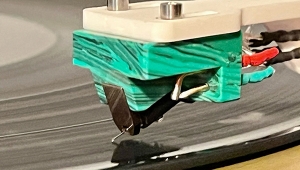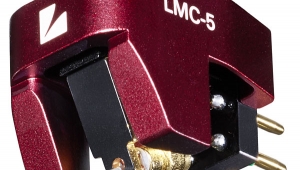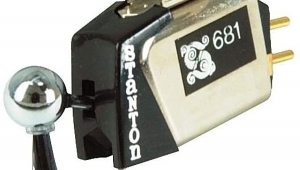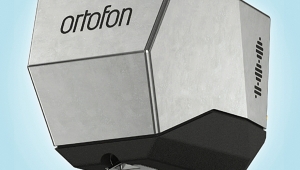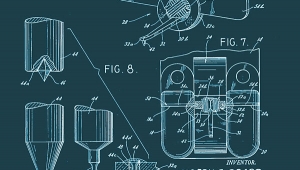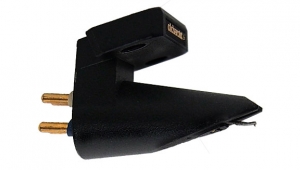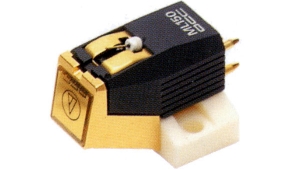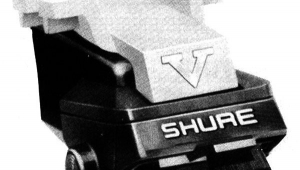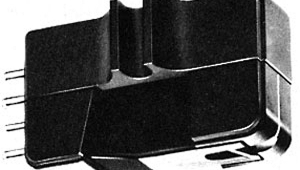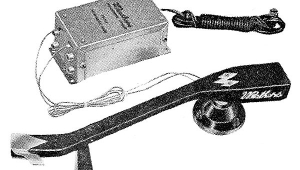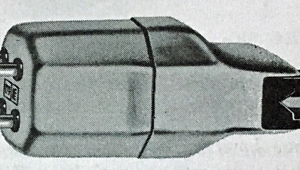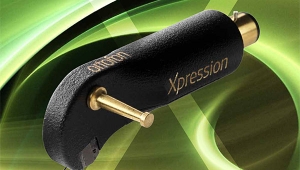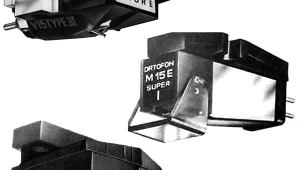| Columns Retired Columns & Blogs |
Clearaudio Virtuoso Wood MM phono cartridge Page 3
Rock? The acid test for bombastic bass reproduction is "Behind the Veil," from Jeff Beck's Guitar Shop (Epic OE 44313). In one passage, Tony Hymas plays the melody on a bass synthesizer that descends lower in frequency than Terry Bozzio's thundering bass drum. The Virtuoso Wood reproduced the melody with perfect clarity—fast, tuneful, with no sense of overhang—and left the bass-drum line intact with no trace of muddiness.
Want to break the lease? Try Grandmaster Flash's The Message (Sugar Hill SH-584) at about 100dB. "Hey you youngsters, stop listening to that crap music! You wanna hear some real rap??" The bass-synth-and-drum-machine bombast did not induce my neighbors to call the police, but only by a dB or two. Despite the perfectly articulated dynamics, the subtle, low-level articulations on snare-drum machine were perfectly intact at the rear of the soundstage. So oh, yes, the Virtuoso Wood might be the affordable cartridge of choice for rock headbangers as well. In fact, I think its overall dynamic performance might have exceeded the already outstanding performance of the Aurum Beta S.
I used the magnifying glass of the Virtuoso Wood to compare three pressings of a single album: Gary Wilson's You Think You Really Know Me. With the Virtuoso, it was very easy to hear that the 1991 reissue (Cry Baby BH03) flawlessly replicated the natural, extended tonal balance of the vocals and instruments on the original 1977 release (Gary Wilson GW001). Furthermore, it was clear that the mastering of the 2002 reissue (Motel MRLP007) had boosted the bass a few dB, and that the midrange was now richer and more holographic, along with some compression in highly modulated high-frequency passages compared to the earlier pressings. In general, the Virtuoso Wood tracked difficult, highly modulated HF passages better than any cartridge I've tried, regardless of price.
The Others
After completing my listening, I switched back to the $450 Clearaudio Aurum Beta S. Although its overall character was similar to the Virtuoso Wood's, there were noticeably less detail and subtle dynamic and transient articulations. Although the Beta S had a neutral tonal balance overall, the slightly more liquid quality of the Virtuoso Wood was slightly more rich. Finally, there was just a bit of a mechanical quality to the presentation of the Aurum Beta S as compared with the Virtuoso Wood.
I compared the Virtuoso Wood with another of my affordable favorites, the Grado Reference Sonata ($500). It had been a while since I'd listened to the Sonata, and once again I was struck by its deliciously warm but natural and inviting tonal balance. It had the rich, holographic midrange of the Virtuoso Wood, but resolved somewhat more detail and ambience through that region. However, the high frequencies were far less detailed, extended, and articulate when compared to the Wood's. Bass definition, extension, and dynamic performance at both extremes were excellent through the Grado, but slightly better still through the Virtuoso Wood.
But remember—the Aurum Beta S and the Grado Reference Sonata are both significantly less expensive than the Virtuoso Wood.
The Fat Lady Sings
Did the performance of the Clearaudio Virtuoso Wood exceed my expectations?
Yes, by a significant margin.
Can I think of any under-$1000 cartridge I've tried in my system that I would rather own than the Virtuoso Wood?
No.
Can I find at least one criticism of the Virtuoso Wood?
No. The performance of the Clearaudio Virtuoso Wood was so ear-opening that I recommend that anyone thinking of spending up to $2500 on a moving-coil cartridge consider buying the $750 Wood instead, and investing the money saved in better components elsewhere in the system.
- Log in or register to post comments
